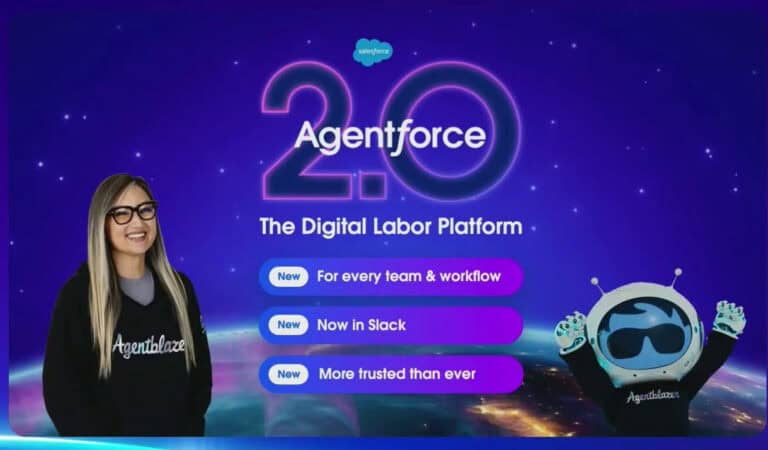Salesforce has just presented Agentforce 2.0, a mere three months after the launch of Agentforce 1.0. The pace of AI development and innovation remains unprecedented. However, it is becoming increasingly clear which tech companies will lead the way in making a difference with AI. Once again, Salesforce raises the bar. Perhaps the most striking message is that Salesforce is venturing far beyond the CRM market. For example, Salesforce can now provide AI agents to organizations operating in entirely different industries and business areas than its core products. The question remains: which platform or SaaS provider can keep up with this pace of innovation?
AI is evolving at lightning speed. The introduction of generative AI marked the beginning of a new wave of innovation. While some are still focused on generative AI alone, Salesforce has moved several steps ahead. Generative AI is now just a small component within the broader offering of AI solutions and new technologies.
With Agentforce 2.0, Salesforce takes another significant step. This update includes a range of new features and innovations set to roll out in the coming months. The centerpiece, however, is the enhanced Reasoning Engine. This new engine connects corporate data, context, business processes, and business logic, enabling a more intelligent and contextualized AI experience. According to Silvio Savarese, Executive Vice President and Chief Scientist for Salesforce AI, the Reasoning Engine represents one of the most challenging developments they ever created.
TIP: Salesforce raises the AI bar with Agentforce; are AI agents replacing employees?
“Don’t Be Afraid, agents are the new apps: build them, test them, use them”
Salesforce CEO and co-founder Marc Benioff urges organizations not to be intimidated by claims that AI agents are still unreliable or years away from practical use. According to Benioff, many companies are just telling stories about AI agents because they haven’t yet developed the technology themselves. While Salesforce drives the market forward, other vendors try to be visionary and delay progress.
Benioff emphasized that AI agents are “the most exciting innovation” he has seen in 25 years. He predicts that AI agents will completely transform the world. “Agents are the new apps: build them, test them, and use them.”
Importantly, building AI agents doesn’t require extensive technical knowledge. Organizations simply describe their requirements in plain language, and Agentforce generates the agent for them. Fine-tuning can be done using a no-code interface, eliminating the need for programming. This brings no-code en generative AI together in a powerful combination.
AI agents for any organization
Salesforce recognizes its leadership role in the AI market and is working hard to make its AI as widely deployable as possible. With the introduction of Agentforce 2.0, even organizations that do not use Salesforce products can still develop AI agents.
An example of this is Adecco, a global workforce solutions provider that helps businesses find staff and supports job seekers. While Salesforce doesn’t offer HR or recruiting solutions, Adecco uses Agentforce to develop AI agents that create better matches between candidates and organizations. Adecco connects its data to the Salesforce Data Cloud and describes the desired AI agent’s function. Agentforce then autonomously builds the AI agent.
In the demo, Salesforce demonstrated that Agentforce can train AI algorithms to function as skills within the platform. For Adecco, this included detecting candidate skills to match them with job requirements.
Agentforce also recognized overlap between matching candidates and Salesforce’s expertise in qualifying inbound sales leads. For example, education levels, skill sets, language proficiency, and location are comparable to criteria used in sales lead qualification. As a result, AI agents can analyze hundreds of resumes in seconds and generate a top-three list of the most suitable candidates. The agent can even schedule interviews automatically.
Salesforce uses Agentforce at help.salesforce.com
Salesforce recently rolled out Agentforce on help.salesforce.com, its customer support platform. Weekly, approximately 32,000 conversations are initiated, with an 83% resolution rate. Previously, around 10,000 conversations escalated to human agents. Since the rollout of Agentforce, this number has been reduced by half, with only 5,000 conversations now requiring human involvement. AI agents resolve the remaining queries.
This makes help.salesforce.com a prime example of how AI agents can streamline customer service workflows, answering questions using knowledge bases and FAQs—an approach that many organizations can adopt.
Slack, MuleSoft and Tableau integrate Agentforce
Agentforce serves as a unified layer across all existing Salesforce solutions:
- MuleSoft: Agentforce can establish connections with previously unknown APIs based on simple descriptions.
- Slack and Tableau: In Slack, AI agents facilitate communication and streamline tasks. In Tableau, advanced reasoning capabilities allow data to be contextualized, producing more meaningful visualizations.
Slack is increasingly becoming the hub for communication, not just between humans, but also with AI agents. As Benioff puts it, we are entering the era of the digital workforce, where AI agents and autonomous systems, such as self-driving cars like Waymo, perform tasks traditionally done by humans.
Also read: Slack builds application ecosystem for collaboration with WorkOS
Innovation pace is disruptive for SaaS providers
If Benioff is right and the world is transforming to a digital labour market with a digital workforce, it will be disruptive for the SaaS market. Salesforce continues to deliver groundbreaking advancements every few months, while major other SaaS players like SAP and ServiceNow struggle to keep up.
Other enterprise SaaS vendors, but especially smaller SaaS providers, will find it impossible to keep up with this innovation pace. Those vendors will become dependent on large cloud players like Amazon and Google for developing and offering them the AI building blocks they need. However, the question is whether these companies will ever come up with a reasoning engine comparable to Salesforce’s. What is certain is that SaaS vendors that don’t do anything with AI agents in 2025 will miss the boat completely.
